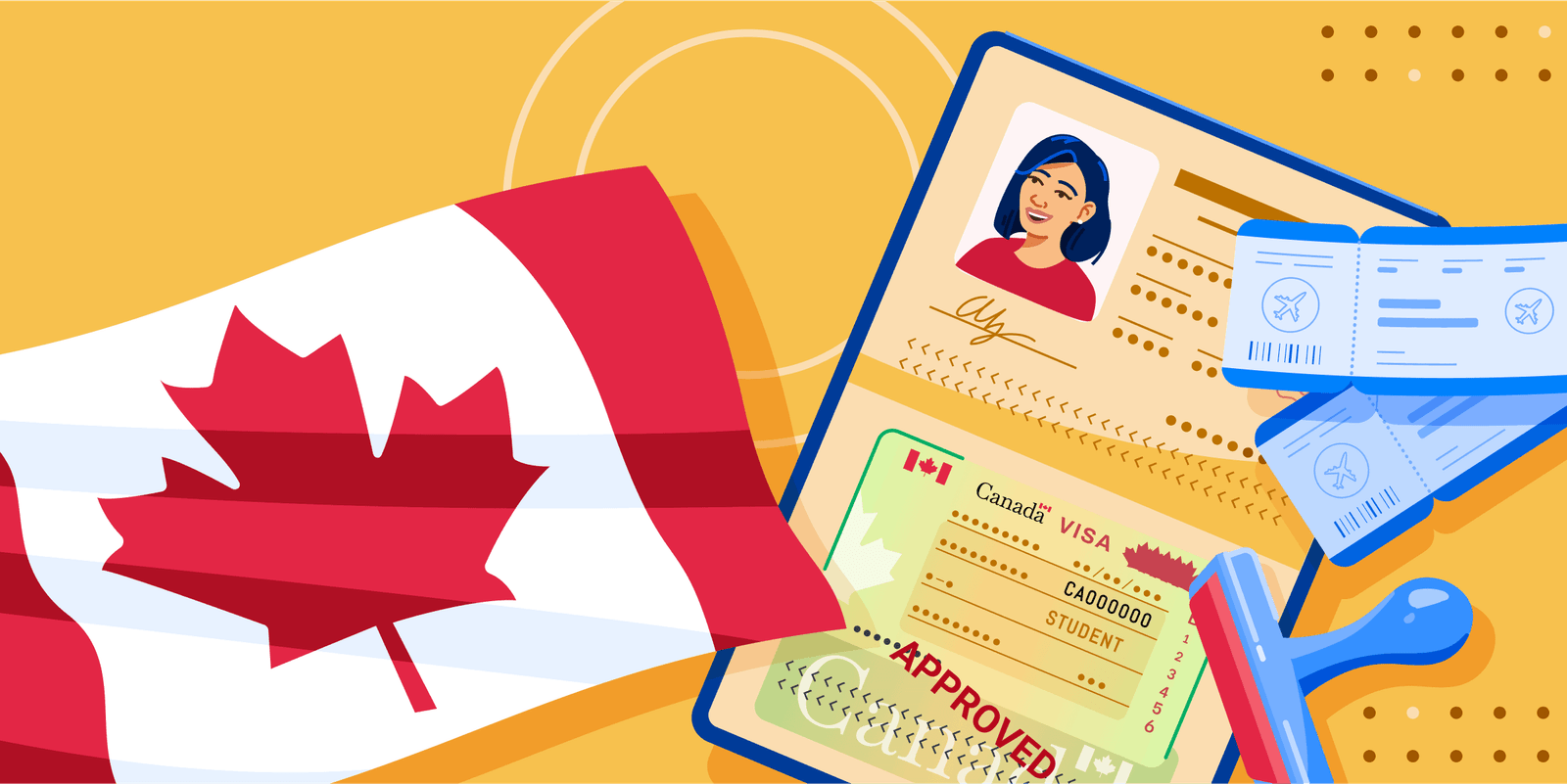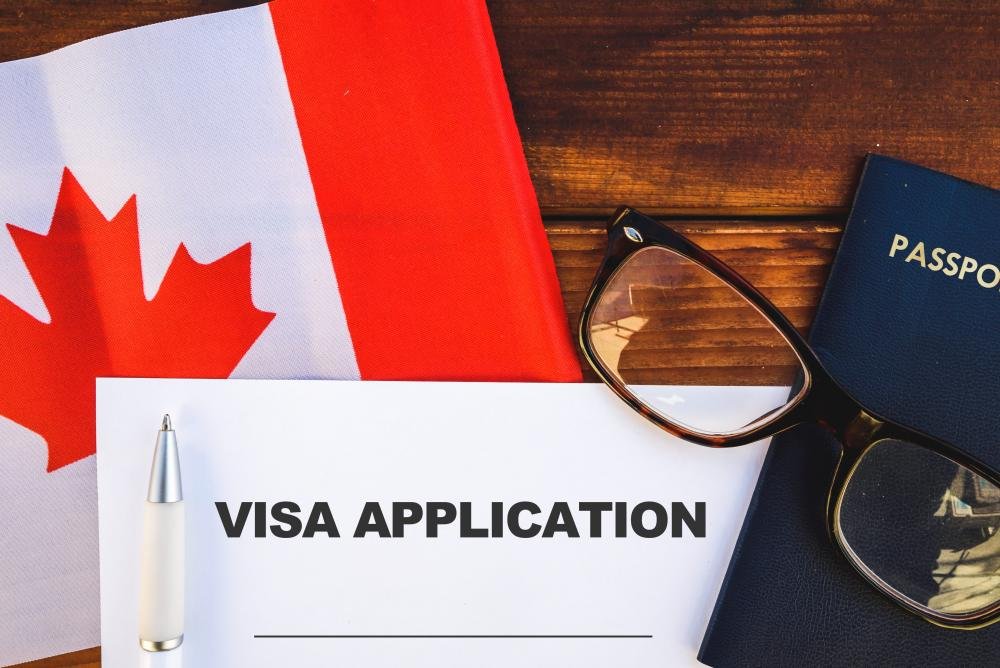Table of Contents
ToggleStudy Visa Canada 2025 Complete Guide to Requirements Process Fees & Eligibility

1. Introduction
Canada has become one of the most popular destinations for international students, thanks to its high-quality education system, cultural diversity, and post-graduation opportunities. A Study visa Canada allows students to pursue academic programs at recognized universities and colleges while enjoying the benefits of a multicultural society. This guide explores the complete requirements, process, fees, and opportunities for students applying in 2025.
2. Why Choose Canada for Higher Education?
Canadian universities rank among the top in the world, offering advanced research facilities, globally recognized degrees, and affordable tuition compared to other leading countries. Beyond academics, Canada’s safe environment, friendly communities, and immigration pathways make it a top choice for students. With a study visa Canada, learners gain not just education but also exposure to global career opportunities.
3. Study Visa Canada Requirements
To apply successfully in 2025, students must meet these key requirements:
Proof of Acceptance: An official letter from a recognized Canadian institution.
Financial Stability: Bank statements or proof of funds to cover tuition fees and living expenses.
Language Proficiency: IELTS, TOEFL, or equivalent test results.
Valid Passport & Photographs: Essential travel documents.
Medical and Police Clearance: To prove good health and character.
Meeting these requirements ensures your study visa Canada application has a higher chance of approval.
4. Step by Step Application Process
The process to apply in 2025 includes:
Choose a Designated Learning Institution (DLI).
Collect required documents.
Submit an online application via the Immigration, Refugees, and Citizenship Canada (IRCC) portal.
Pay the visa application fees.
Provide biometrics and attend an interview if required.
Wait for approval and receive your study permit.
5. Fees and Processing Time
Application Fee: CAD 150 (approx.).
Biometric Fee: CAD 85.
Processing Time: Varies by country, generally 4–12 weeks.
Planning ahead is crucial to avoid delays, especially during peak application seasons.
6. Work Opportunities for International Students
One of the biggest advantages of studying in Canada is the ability to work part-time during your studies and full-time during scheduled breaks. After graduation, students can apply for a Post-Graduation Work Permit (PGWP), which opens pathways to permanent residency.
7. Tips to Avoid Rejection
Ensure your documents are complete and accurate.
Demonstrate strong financial proof.
Clearly state your study intentions and future goals.
Maintain honesty in your application.
These steps increase your chances of securing approval without unnecessary hurdles
Introduction

Introduction
Canada has consistently ranked among the top destinations for international students, attracting thousands each year with its high-quality education, welcoming culture, and globally recognized degrees. In 2025, the appeal is stronger than ever, as Canadian universities and colleges continue to rise in global rankings while offering a wide range of courses across technology, business, healthcare, engineering, and creative industries. Students from all over the world see Canada as a place where education meets opportunity, and obtaining a study visa Canada is the first step toward achieving those dreams.
One of the biggest reasons students choose Canada is the emphasis on practical learning and research-driven programs. Unlike many other countries, Canada provides a strong balance between academic knowledge and real world application, ensuring that graduates are job-ready. The country’s multicultural environment also makes it easier for international students to adapt, find communities that feel like home, and develop global perspectives. A study visa Canada does more than just allow access to classrooms it opens doors to a vibrant cultural experience and opportunities to build lifelong networks.
Another compelling factor is the affordability compared to other top destinations like the United States, the United Kingdom, or Australia. While tuition fees are competitive, Canada also offers a variety of scholarships, bursaries, and part-time work opportunities that help students manage expenses. Additionally, the Canadian government has policies in place to support international students, including pathways to permanent residency for those who wish to stay and build a future in the country. For many, this makes a study visa Canada not just an entry point for education but also a potential gateway to long-term settlement.
Moreover, safety and quality of life play a major role in Canada’s popularity. Known for its stable political system, low crime rates, and healthcare accessibility, Canada provides a secure and comfortable environment for learning. Students can enjoy not just academic success but also an excellent lifestyle surrounded by natural beauty, modern cities, and inclusive communities.
In conclusion, the introduction to studying in Canada highlights the unique blend of academic excellence, cultural diversity, affordability, and post-graduation opportunities. For anyone aspiring to build a strong international career, Canada remains one of the most promising destinations in 2025.
Why Choose Canada for Higher Education?

Why Choose Canada for Higher Education?
Canada has become one of the most preferred destinations for international students, and the reasons go far beyond just quality education. In 2025, the country continues to attract learners from every corner of the globe because of its strong academic standards, safe environment, and welcoming multicultural society.
One of the primary advantages of choosing Canada is the world-class universities and colleges spread across the nation. These institutions consistently rank high in global education indexes and are known for offering a variety of programs in engineering, business, healthcare, information technology, and creative fields. Whether you aim to pursue undergraduate, postgraduate, or research studies, Canada ensures that students receive training that matches international industry standards.
Affordability is another major factor. While tuition fees in other popular destinations like the USA, UK, or Australia can be overwhelming, Canada offers comparatively lower tuition rates without compromising academic excellence. On top of that, the cost of living in cities like Ottawa, Montreal, or Halifax is relatively moderate, making it easier for students to manage finances while pursuing their studies.
A study visa Canada also comes with added benefits such as part-time work rights. International students are allowed to work up to 20 hours a week during semesters and full-time during scheduled breaks. This not only helps them gain valuable work experience but also makes it easier to manage living expenses. After completing their education, students can apply for a Post Graduation Work Permit (PGWP), which serves as a pathway to permanent residency. This opportunity makes Canada not just an education hub but also a long-term career destination.
Safety and inclusivity further strengthen Canada’s appeal. Known for being one of the safest countries in the world, Canada embraces diversity and ensures that international students feel at home. The supportive environment allows learners to focus on their academics while enjoying cultural experiences.
In short, a study visa Canada is more than just a ticket to classrooms it’s an entryway to quality education, real-world work opportunities, and a bright career future. With its high living standards, excellent academic reputation, and immigration-friendly policies, Canada continues to stand out as a top destination for higher education in 2025.
Study Visa Canada Requirements

Study Visa Canada Requirements
Applying for a study visa Canada requires careful preparation and attention to detail. International students must meet specific eligibility criteria set by the Immigration, Refugees, and Citizenship Canada (IRCC). These requirements ensure that applicants are financially capable, academically prepared, and genuinely interested in pursuing higher education in Canada. Below are the key requirements explained in detail for 2025.
1. Proof of Acceptance
The first requirement is a valid Letter of Acceptance from a Designated Learning Institution (DLI) in Canada. Without this official confirmation, a student cannot proceed with the visa application. The letter should clearly mention the program details, duration, and institution’s recognition status.
2. Financial Proof
Applicants must show they have sufficient funds to cover tuition fees, living expenses, and return transportation. This is usually proven through bank statements, scholarship letters, or sponsorship documents. For a single student, the required amount is approximately CAD 10,000 per year in addition to tuition costs.
3. Language Proficiency
Since most universities and colleges in Canada teach in English or French, proof of language proficiency is required. Students must provide IELTS, TOEFL, or equivalent test scores. Some institutions may waive this requirement if previous education was in English or French.
4. Valid Passport and Photographs
A valid passport with sufficient validity is mandatory. Passport-size photographs must also meet Canadian visa specifications.
5. Medical and Police Clearance
Applicants must undergo a medical examination to prove good health. A police clearance certificate may also be required to confirm that the applicant has no criminal background.
6. Statement of Purpose (SOP)
A strong SOP explaining study plans, choice of program, and career goals is crucial. It helps the visa officer understand the applicant’s genuine intent.
7. Additional Documents
Depending on the country of origin, additional documents may be required, such as academic transcripts, biometrics, or proof of work experience.
Step by Step Application Process

Step by Step Application Process
Applying for a Study visa Canada may seem challenging, but with the right steps and preparation, you can complete the process smoothly. The application is designed to ensure that only genuine students with a clear academic purpose and financial stability are granted permits. Below is a detailed, step-by-step guide for 2025:
1. Choose a Designated Learning Institution (DLI)
Start by selecting a Canadian college or university that is recognized by the government as a DLI. Without an acceptance letter from a DLI, your application cannot be processed.
2. Gather Required Documents
Prepare essential documents such as:
A valid passport.
Letter of acceptance from the DLI.
Proof of financial funds to cover tuition fees, living expenses, and return travel.
Language test results like IELTS or TOEFL.
Medical exam results and police clearance (if applicable).
Organizing these documents in advance reduces the chances of delays or rejections.
3. Submit Online Application
Create an account on the official IRCC (Immigration, Refugees, and Citizenship Canada) portal. Upload scanned copies of all required documents and fill out the study permit application form carefully. Any errors or missing details can cause unnecessary delays.
4. Pay the Fees
The standard application fee is CAD 150, along with a biometric fee of CAD 85. Payments can be made online via credit or debit card.
5. Provide Biometrics and Attend Interview (if required)
Most applicants will need to provide fingerprints and a digital photo at a Visa Application Centre. In some cases, an interview may be requested to confirm your intent to study.
6. Wait for Processing
Processing times vary depending on your country of residence but generally range between 4–12 weeks. Tracking your application status online helps you stay updated.
7. Receive Approval and Travel to Canada
Once your Study visa Canada is approved, you will receive a Port of Entry (POE) Letter of Introduction. Carry this document along with your passport when you travel. A study permit will then be issued at the Canadian border by an immigration officer.
By carefully following these steps, students can ensure a smoother application experience and maximize their chances of obtaining a Study visa Canada successfully.
Fees and Processing Time

Fees and Processing Time
When applying for a study visa Canada, it is important to understand the costs involved and the average waiting time for approval. Planning ahead with a clear idea of fees and timelines helps applicants avoid delays and ensures they can start their academic journey on time.
Application Fees
The primary cost for a Canadian study permit application is CAD 150. This fee is payable when you submit your application online or through a visa application center. In addition, applicants are required to pay a biometric fee of CAD 85. Biometrics include fingerprints and a photo, which are necessary for identity verification. Together, these fees cover the standard visa processing requirements set by Immigration, Refugees, and Citizenship Canada (IRCC).
Additional Costs
Beyond the official visa fees, students should be prepared for other expenses such as medical examinations, police certificates, translation of documents, and courier services if applicable. In most cases, medical exams may cost between CAD 100–200, depending on the country of residence. These additional expenses vary and should be budgeted in advance.
Processing Time
The average processing time for a study visa Canada application in 2025 typically ranges between 4 to 12 weeks, depending on the applicant’s home country and the volume of applications received. Some students may experience faster processing through the Student Direct Stream (SDS), a program available to applicants from select countries that usually provides results within 20 days. However, SDS requires meeting specific criteria such as higher language test scores and proof of upfront tuition payment.
Factors Affecting Timelines
Several factors influence how long it takes to receive approval. Incomplete documentation, unclear financial proof, or errors in the application can cause delays. Seasonal demand also plays a major role, as applications submitted during peak times, like summer, may take longer than those filed in less busy months.
Preparing in Advance
To minimize stress, applicants should apply at least six months before their intended program start date. This provides sufficient time for processing, medical checks, and travel arrangements. Being proactive also gives students a buffer to handle unexpected requests from IRCC, such as additional documents or interviews.
In summary, the fees and timelines for a study visa Canada application are straightforward but require careful planning. Understanding the costs and applying early ensures that students can begin their studies in Canada without unnecessary obstacles.
Work Opportunities for International Students

Work Opportunities for International Students
One of the most attractive benefits of choosing Canada as a study destination is the wide range of work opportunities available for international students. Earning while learning not only helps students cover living expenses but also provides valuable work experience that contributes to their career growth. A Study visa Canada allows students to explore both part-time and full-time job opportunities during their academic journey.
Part Time Work During Studies
Students in Canada are permitted to work up to 20 hours per week during regular semesters. This flexibility ensures that they can balance studies while gaining practical exposure. Common part-time jobs include working in retail stores, restaurants, libraries, or even as teaching assistants at universities. For students looking to build professional skills, internships and co-op programs linked with academic courses are an excellent choice.
Full Time Work During Breaks
During scheduled breaks such as summer or winter holidays, students can work full-time without restrictions. This is a great way to save money and gain hands-on experience. Many international students use these breaks to secure internships in their field of study, which enhances their resumes and increases employability after graduation.
Post Graduation Work Permit (PGWP)
The real advantage of holding a Study visa Canada comes after graduation. Eligible students can apply for the Post Graduation Work Permit (PGWP), which allows them to work in Canada for up to three years depending on the duration of their program. This experience is highly valuable, as Canadian work experience can also contribute toward permanent residency applications.
Benefits of Working While Studying
Gain financial independence.
Build practical skills and professional networks.
Enhance your resume with Canadian work experience.
Increase eligibility for permanent residency pathways.
Tips to Avoid Rejection

Tips to Avoid Rejection
Applying for a study visa Canada is a major step toward achieving your dream of studying abroad. However, many applications face rejection due to incomplete paperwork, financial issues, or unclear study intentions. To increase your chances of approval, you must carefully prepare your application and avoid common mistakes.
1. Provide Accurate Documentation
One of the leading causes of visa rejection is missing or incorrect documents. Ensure that all forms are completed properly and that your passport, acceptance letter, financial proof, and academic transcripts are up to date. Submitting false or inconsistent details can immediately lead to rejection. Always double-check before submitting.
2. Demonstrate Strong Financial Proof
Canadian immigration authorities want to make sure students can support themselves during their stay. You must provide sufficient evidence of funds to cover tuition fees, accommodation, and living expenses. Bank statements, scholarships, or sponsorship documents should be genuine and recent. Weak financial proof is one of the fastest ways to have your study visa Canada application refused.
3. Show Genuine Study Intentions
Officers assess whether you genuinely intend to study in Canada or misuse the visa for work or immigration purposes. Clearly explain your chosen course, how it aligns with your academic background, and your career goals. A well-written statement of purpose (SOP) is an excellent way to demonstrate your genuine interest.
4. Maintain Language Proficiency Standards
Since most Canadian programs are taught in English or French, demonstrating strong language skills is crucial. Submitting valid IELTS, TOEFL, or French language scores ensures that you meet academic requirements. Low scores or missing proof of language ability often result in rejection.
5. Highlight Home Country Ties
Visa officers want to be assured that students will return after completing their studies. Demonstrating ties to your home country such as family, property, or a career plan can reassure authorities of your genuine intentions.
6. Be Honest in Your Application
Any discrepancies, false documents, or misleading information can permanently affect your chances of obtaining a visa. Honesty and transparency are essential throughout the application process.
Final Thoughts

Final Thoughts
Pursuing higher education in a global destination is a dream for millions of students, and Canada continues to shine as one of the best choices in 2025. With its world-class universities, cutting-edge research facilities, and safe multicultural environment, students are offered not only academic excellence but also an enriching personal experience. For anyone planning to apply, understanding the full details of a study visa Canada is the first and most important step.
Canada stands out for its inclusive policies, strong international student support, and clear immigration pathways. The country provides opportunities not only to study but also to work during academic terms and after graduation, which is highly valuable for building real world skills. A study visa Canada is much more than an entry document it is a gateway to professional growth, cultural exchange, and long-term career success. By carefully preparing all necessary documents, proving financial stability, and choosing the right institution, students can ensure a smooth application process.
It’s also important to note that Canada offers flexible academic programs that align with future career opportunities. Whether one chooses fields like technology, healthcare, business, or creative industries, the Canadian education system ensures quality and recognition across the world. With an increasing demand for skilled graduates, international students find themselves in a strong position to secure jobs and even pathways to permanent residency.
When applying, students should remain mindful of potential challenges such as incomplete documentation, unclear academic goals, or insufficient proof of funds. These factors can result in delays or rejections. By seeking proper guidance and ensuring all requirements are met, applicants can strengthen their chances of success.
In conclusion, a study visa Canada in 2025 represents more than the chance to study abroad—it symbolizes an opportunity to expand horizons, achieve academic excellence, and step confidently into a future filled with possibilities. For ambitious students looking to combine world-class education with practical career growth, Canada remains one of the top destinations to consider.
FAQs on Study Visa Canada 2025
Q1. What is a study visa Canada?
A study visa Canada, also known as a study permit, is an official document that allows international students to study at designated learning institutions in Canada.
Q2. What are the eligibility requirements for a Canada study visa in 2025?
Students must have an acceptance letter from a Canadian institution, proof of funds, a valid passport, language test results, and medical and police clearance.
Q3. How much does a Canada study visa cost?
The study permit application fee is CAD 150, and the biometric fee is CAD 85, making the total cost approximately CAD 235.
Q4. How long does it take to process a study visa Canada application?
Processing time varies depending on the applicant’s country, but it usually takes between 4 to 12 weeks.
Q5. Can I work while studying in Canada?
Yes. International students with a valid study visa Canada can work up to 20 hours per week during academic sessions and full-time during scheduled breaks.
Q6. Can I stay in Canada after completing my studies?
Yes. Students can apply for a Post-Graduation Work Permit (PGWP), which allows them to work in Canada and may lead to permanent residency.
Q7. Do I need IELTS to apply for a Canada study visa?
In most cases, yes. However, some institutions may accept alternative English proficiency tests or exemptions based on prior education.
Q8. Can my family accompany me on a Canada study visa?
Yes. Spouses and dependent children can apply for open work permits or visitor visas to stay in Canada while you study.
Q9. What are common reasons for Canada study visa rejection?
Lack of financial proof, incomplete documents, unclear study plans, or doubts about returning home after studies can lead to rejection.
Q10. Can I extend my study visa in Canada?
Yes. If your program takes longer than expected, you can apply to extend your study permit before it expires.






